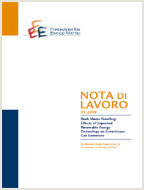Migration and Climate Change in Rural Africa

Data
10.04.2015
10.04.2015
Autori
Cristina Cattaneo (Fondazione Eni Enrico Mattei); Emanuele Massetti (Georgia Institute of Technology, CESIfo, Fondazione Eni Enrico Mattei)
Codice JEL
O15, Q54, R23
O15, Q54, R23
Parole chiave:
Climate Change Impacts, Migration, Development Economics
Climate Change Impacts, Migration, Development Economics
Publisher
Climate Change and Sustainable Development
Climate Change and Sustainable Development
Editor
Carlo Carraro
Carlo Carraro
We analyse whether migration is an adaptation that households employ to cope with climate in Ghana and Nigeria. If migration is part of the present adaptation portfolio of households in developing countries, it is reasonable to expect that it will also be an adaptation to future climate change. It is important to stress that we are interested in long-term climatic conditions rather than in short-term weather fluctuations. The data to test these predictions are drawn from two different household surveys: the Nigeria General Household Survey and the Ghana Living Standard Survey. We find a hill-shaped relationship between temperature in the dry sea son and the propensity to migrate in households that operate farms. We also find a significant hill-shaped relationship between precipitations in the wet seasons and the propensity to migrate in farm households. Climate has instead no significant impact on the propensity to migrate in non-farm households. Climate change scenarios generated by General Circulation model reveal that, ceteris paribus, migration may decline in Ghana and in Nigeria.
***
Suggested citation: Cattaneo, C., E. Massetti, (2015), ‘Migration and Climate Change in Rural Africa’, Nota di Lavoro 29.2015, Milan, Italy: Fondazione Eni Enrico Mattei
